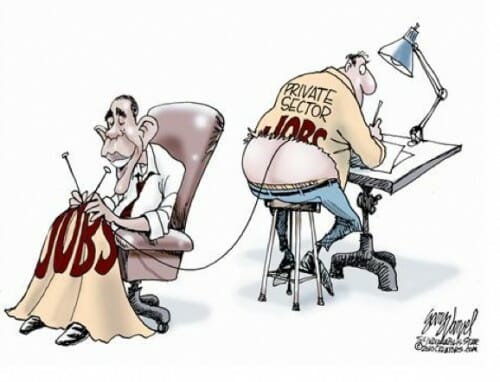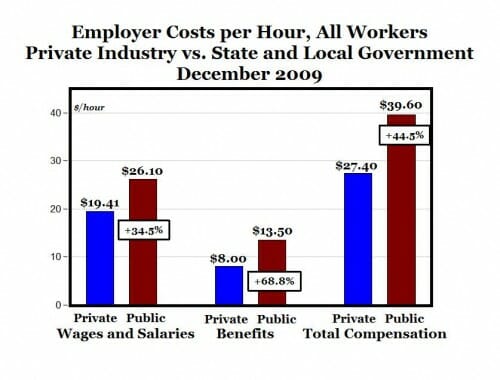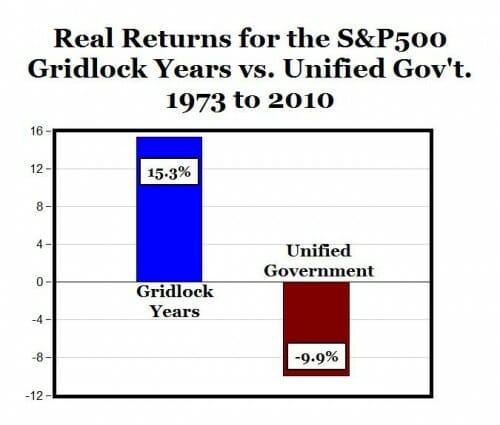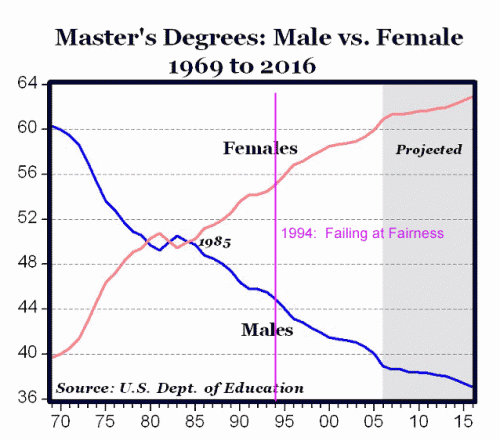I am really swamped at work, but I have a number of good things saved that I want to share.
1. This picture is the best single explanation of what is wrong with the stimulus jobs creation numbers -- the stimulus money comes from somewhere, and starves efficient businesses of capital in favor of politically connected endeavors. HT Russ Roberts

2. More on what I call the only good idea for reducing health care spending -- making individuals responsible for making price-value purchasing tradeoffs like we do, oh say, with absolutely everything else we buy. This article on on HSA's in Indiana:
State employees enrolled in the consumer-driven plan will save more than $8 million in 2010 compared to their coworkers in the old-fashioned preferred provider organization (PPO) alternative. In the second straight year in which we've been forced to skip salary increases, workers switching to the HSA are adding thousands of dollars to their take-home pay.
Most important, we are seeing significant changes in behavior, and consequently lower total costs. In 2009, for example, state workers with the HSA visited emergency rooms and physicians 67% less frequently than co-workers with traditional health care. They were much more likely to use generic drugs than those enrolled in the conventional plan, resulting in an average lower cost per prescription of $18. They were admitted to hospitals less than half as frequently as their colleagues. Differences in health status between the groups account for part of this disparity, but consumer decision-making is, we've found, also a major factor.
Mark Perry reports in a later post that Congress is declaring war on HSA's
3. There has been a lot of good stuff lately on the growing rift between the two America's -- those in government or with access to government patronage and those who actually make a living by being productive. I am increasingly convinced that Obama and Congress are working to create a European-style corporate state, where government insiders, a few large corporations, and a few large unions protect themselves against everyone else. Katherine Mangu-Ward looks at a study of government vs. private pay for the same jobs. It used to be government paid less in return for having to work less hard and being impossible to fire. Now government workers have it all.
There are two million civilian federal workers. 1.1 million of them have direct private sector equivalents. And they are laughing their asses off at those private sector suckers, who are doing similar jobs for less pay"â€often a lot less.
"Accountants, nurses, chemists, surveyors, cooks, clerks and janitors are among the wide range of jobs that get paid more on average in the federal government than in the private sector," according to a USA Today report. In jobs where there are private equivalents, the feds are earning $7,645 more on average than their private counterparts.
Her post has more data. And an update and response to criticisms is here. Mark Perry looks at wage growth, and the difference is amazing. Government employees are the new robber barons, and this time, the title is appropriate.

And speaking of the corporate state, this was an interesting essay at the Claremont Institute, via Maggies Farm.
Joseph Schumpeter ominously speculated that as capitalism succeeded, democracies in time would come to expect its end (wealth) but reject its means (free-market competition). He worried that because of the inequality and creative destruction it brings, capitalism would provoke a kind of adverse reaction. A popular call would arise for government to plan market outcomes according to some utopian view of society's good, and this democratically guided central planning would inevitably slow economic growth. Schumpeter predicted, in turn, that if economic expansion faltered, individual liberty would be directly imperiled or quietly ceded by citizens resigned to having their diminished economic position protected by the state.
The one mistake writers often make is to call capitalism a "system." Capitalism is the un-system. It is the lack of a system. It is the natural self-organization of individuals when they freely follow their own self-interest.
4. The individual responsibility story of the day, via Overlawyered
In 2004, truck driver Simon Loza Mejia violated company regulations, and took his eight-year-old Diana Yuleidy Loza-Jimenez along on a long-haul trip from Oregon to Bakersfield. That November 27, he was pulling away in the truck, but apparently didn't bother to check where his daughter was, and ran over her. This was, argued her attorneys, the fault of her father's employer"â€and a Sacramento County judge agreed with the argument that it was legally irrelevant that her father was the one who ran her over. Unsurprisingly, a jury ignorant of the facts awarded Diana, whose lower body was crushed, a jackpot verdict of $24.3 million.
5. Charter schools in Harlem. Never have so many kids been held hostage to so few, in this case a few union officials and their captive legislators.
The United Federation of Teachers and its political acolytes in the New York state legislature are hell-bent on blocking school choice for underprivileged families. Worried that high-performing charters are "saturating" Harlem, State Sen. Bill Perkins and State Assemblyman Keith Wright have backed legislation that would gut state per-pupil funding at charter schools and allow a single charter operator to educate no more than 5% of a district's students. Unions dislike charter schools because many aren't organized. But how does limiting the replication of successful public education models benefit ghetto kids?
These obstructionists, Mr. Clark says, aren't doing the community any favors. "The teachers unions ought to be ashamed of themselves because they know better than I do how bad these schools are," he says. "Everybody on my block and in my building and around the corner . . . they all want charter schools. They don't want a political debate."
Separately, John Stoessel digs into Diane Ravitch's shilling for the teachers unions.
6. I could have sworn the politicians swore up and down they would never ever interfere with business decisions at GM.
General Motors Co. will reinstate 661 dealerships it sought to drop from its sales network.GM executives said Friday that the dealerships -- more than half of those seeking to stay with the automaker -- will receive letters giving them the option to remain open. GM said it would not have enough time to negotiate with all 1,100 dealerships that appealed the automaker's decision to close them within a four-month window imposed by the federal government....
"It's not exactly what they wanted to do, and it's always I think a little embarrassing when you have to make changes based on an arbitration process, but they've had to adjust and move forward," he said.
Well, at least the Congress and the DOT is hammering GM's competitor Toyota, so I guess they can call it even. Welcome to Europe, guys. I have said it before, but this is exactly the kind of BS European nations do all the time - hammering foreign competitors of their domestic politically connected manufacturers in exchange for substantial ability to regulate and modify these companies decisions. Soon to follow - Europe's lower growth rates and higher structural unemployment.
7. Dog bites man: Paul Krugman still a political hack who is willing to eschew everything he knows or has written about economics to support his team.






